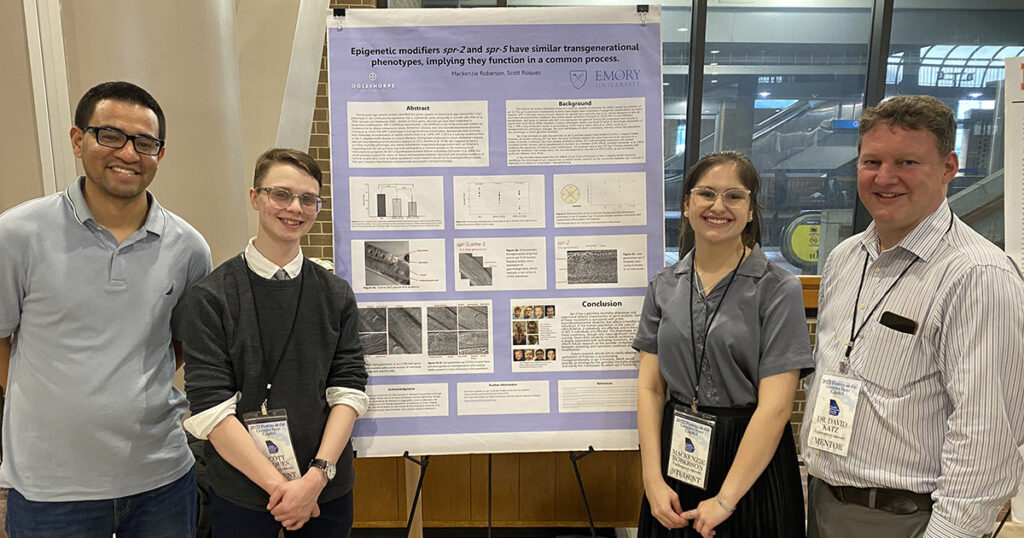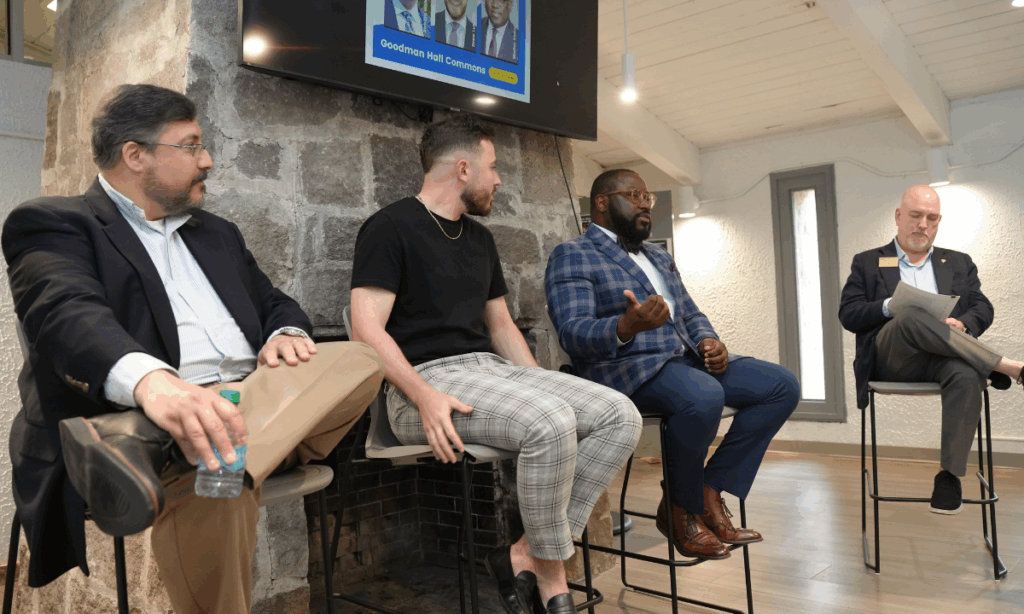Oglethorpe’s reputation for undergraduate research continues to grow with the recent inclusion of biology majors Mackenzie Roberson and Scott Roques in the Feb. 27 “Posters at the Georgia State Capitol” event hosted by the Georgia Undergraduate Research Collective.

Conducted in Fall semester 2022, Roberson’s and Roques’ project was titled “Epigenetic modifiers spr-2 and spr-5 have similar transgenerational phenotypes, implying they function in a common process.” Translation? The research duo looked at a genetic mutation and established a link with another mutation that had never before been identified.
“It is a challenge to tell people about our research,” said Roques, a senior from Lafayette, La. “Last semester when we made an exciting discovery in the lab, we would both come out of the building and immediately call our moms. We had to tell somebody. I’m sure our moms didn’t always know what we were talking about, but they did know we were excited about our research.”
Roberson and Roques were able to tell more people than their moms this week at the fifth annual event at the Capitol, hosted by the Georgia Undergraduate Research Collective. Their instructor, Dr. David Katz, and his graduate student Juan Rodriguez joined them for the event as they explained their research findings to state officials and others interested in epigenetic research.
“One of the skills Oglethorpe teaches you is how to communicate about science,” said Roberson, a junior from Kennesaw, Ga. “It was really fun practicing how we were going to talk about this.”
Epigenetics is the study of changes in organisms caused by modification of gene expression rather than alteration of the genetic code itself. The organisms Roberson and Roques studied were nematodes known as C. elegans. Grown in the lab at Oglethorpe, the study of C. elegans is an important part of Oglethorpe’s biology curriculum.
The investment in C. elegans husbandry over the years has allowed Oglethorpe students to see genetic effects in generations of an organism in a relatively short time period. The C. elegans reproduce relatively quickly, and the effects of a genetic mutation from generation to generation can be observed in the span of a single semester.
“The worms are very picky,” Roberson said. “They have to be incubated in the biology lab, and we had to move them to a new plate every three days.”
“They’re smaller than a period at the end of a sentence,” Roques said. “We had to use tiny titanium instruments to move them without harming them or stressing them out. It’s incredibly difficult and harder to do with each generation affected by the mutation. It’s incredible Oglethorpe gives us the opportunity to do what amounts to graduate school level research.”
When Roques enrolled at Oglethorpe, he was heading toward a career in medicine. Roberson wanted to pursue public health. They discovered a passion for cell biology and research during their time at Oglethorpe, and the capstone research class has only further whetted their appetites for careers in scientific research.
“I came to Oglethorpe because of the public health program,” Roberson said. “I took this class for fun. I realized in this class when I left the lab every day so excited that I wanted to continue doing research in cell biology.”
By discovering a link between the genetic mutation spr-2 and a similar mutation spr-5, Roberson and Roques helped advance the science around cancer, Alzheimer’s Disease and other rarer neurodevelopmental disorders such as Kabuki Syndrome. The next logical step in their research would be to study the mutation in larger animals like mice.
The partnership with Emory University has produced greater results than Dr. Karen Schmeichel of Oglethorpe and Dr. David Katz of Emory had hoped for when they first set it in motion in 2017.
“Oglethorpe has really good students,” said Katz. “They are diamonds in the rough. They just need exposure to the equipment and methods. Mackenzie and Scott are two of the best I’ve worked with. I look forward to seeing what they accomplish.”







